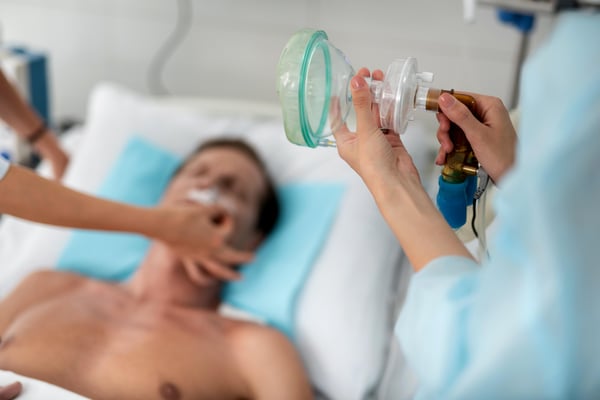Full-Dose Anticoagulation Beneficial for Critically Ill With COVID-19

FRIDAY, Sept. 16, 2022 (HealthDay News) -- Full-dose anticoagulation reduces thrombotic complications in critically ill patients with COVID-19, according to a study published online Aug. 29 in Circulation to coincide with the European Society of Cardiology Congress 2022, held from Aug. 26 to 29 in Barcelona, Spain.
Erin A. Bohula, M.D., D.Phil., from Brigham and Women's Hospital in Boston, and colleagues examined the safety and efficacy of prophylactic full-dose anticoagulation and antiplatelet therapy in critically ill COVID-19 patients. A total of 390 patients at 34 centers were randomly assigned between anticoagulation strategies (full-dose anticoagulation or standard-dose prophylactic anticoagulation) and 292 were randomly assigned between antiplatelet strategies (clopidogrel or no antiplatelet therapy).
The researchers found that the proportion of wins was greater for full-dose versus standard-dose anticoagulant (12.3 versus 6.4 percent; win ratio, 1.95). The results were consistent in a time-to-event analysis for the primary efficacy end point (hierarchical composite of death due to venous or arterial thrombosis, pulmonary embolism, clinically evident deep venous thrombosis [DVT], type 1 myocardial infarction, ischemic stroke, systemic embolic event or acute limb ischemia, or clinically silent DVT, through hospital discharge or 28 days; 9.9 versus 15.2 percent; hazard ratio, 0.56). The primary safety end point of fatal or life-threatening bleeding occurred in 2.1 and 0.5 percent on full-dose and standard-dose anticoagulation, respectively. No differences were seen in the primary efficacy or safety end points for clopidogrel versus no antiplatelet therapy.
"COVID-PACT shows that, compared with standard-dose prophylaxis, full-dose anticoagulation more effectively prevents the clotting complications of COVID-19," a coauthor said in a statement.
Several authors disclosed financial ties to the pharmaceutical industry.
Abstract/Full Text (subscription or payment may be required)
Was this page helpful?
Was this page helpful?
Was this page helpful?
Was this page helpful?
Was this page helpful?
Was this page helpful?
Was this page helpful?
Was this page helpful?
Was this page helpful?
Was this page helpful?
Was this page helpful?
Was this page helpful?
Was this page helpful?
Was this page helpful?
Was this page helpful?
Was this page helpful?
Was this page helpful?
Was this page helpful?
Was this page helpful?
Was this page helpful?
Was this page helpful?
Was this page helpful?
Was this page helpful?
Was this page helpful?
Was this page helpful?
Was this page helpful?
Was this page helpful?
Was this page helpful?
Was this page helpful?
Was this page helpful?
Was this page helpful?
Was this page helpful?
Was this page helpful?
Was this page helpful?
Was this page helpful?
Was this page helpful?
Was this page helpful?
Was this page helpful?
Was this page helpful?
Was this page helpful?
Was this page helpful?
Was this page helpful?
Related Posts
Menopause Tied to Proatherogenic Changes in Circulating Metabolites
FRIDAY, May 13, 2022 (HealthDay News) -- Menopause is associated with...
Nonalcoholic Fatty Liver Disease Underdiagnosed in Adults
THURSDAY, April 14, 2022 (HealthDay News) -- More than one in four adults...
An Expert Answers Your Questions About Prostate Cancer
TUESDAY, Sept. 5, 2023 (HealthDay News) -- It’s important for men to be familiar...
